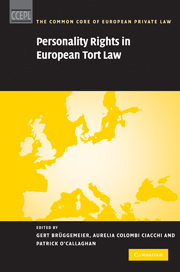Book contents
- Frontmatter
- Contents
- List of contributors
- National reporters
- General editors' preface
- Preface
- Editorial note
- List of abbreviations
- Part I Mapping the legal landscape
- Part II Case studies
- 4 Case 1: The corrupt politician
- 5 Case 2: Convicted law professor
- 6 Case 3: The paedophile case
- 7 Case 4: An invented life story?
- 8 Case 5: A former statesman's family life
- 9 Case 6: A satirical magazine
- 10 Case 7: A snapshot of a person
- 11 Case 8: A paparazzo's telephoto lens
- 12 Case 9: Naked.Little.Girl.Com
- 13 Case 10: The late famous tennis player
- 14 Case 11: The popular TV presenter
- 15 Case 12: Copied emails
- 16 Case 13: Brigitte's diaries
- 17 Case 14: Tape recordings of a committee meeting
- 18 Case 15: ‘Light cigarettes reduce the risk of cancer’
- 19 Case 16: Doctor's non-disclosure of a foetal disease
- 20 Case 17: WAF – A gang of incompetents?
- Part III A common core of personality protection
- Index
16 - Case 13: Brigitte's diaries
from Part II - Case studies
Published online by Cambridge University Press: 06 July 2010
- Frontmatter
- Contents
- List of contributors
- National reporters
- General editors' preface
- Preface
- Editorial note
- List of abbreviations
- Part I Mapping the legal landscape
- Part II Case studies
- 4 Case 1: The corrupt politician
- 5 Case 2: Convicted law professor
- 6 Case 3: The paedophile case
- 7 Case 4: An invented life story?
- 8 Case 5: A former statesman's family life
- 9 Case 6: A satirical magazine
- 10 Case 7: A snapshot of a person
- 11 Case 8: A paparazzo's telephoto lens
- 12 Case 9: Naked.Little.Girl.Com
- 13 Case 10: The late famous tennis player
- 14 Case 11: The popular TV presenter
- 15 Case 12: Copied emails
- 16 Case 13: Brigitte's diaries
- 17 Case 14: Tape recordings of a committee meeting
- 18 Case 15: ‘Light cigarettes reduce the risk of cancer’
- 19 Case 16: Doctor's non-disclosure of a foetal disease
- 20 Case 17: WAF – A gang of incompetents?
- Part III A common core of personality protection
- Index
Summary
Case
Jonathan, a house owner, found some diaries in his attic belonging to Brigitte who had been living there twenty years before. Jonathan became the owner of the books and published the diaries. Does Brigitte have any claim against Jonathan? Would it make a difference if Jonathan made some effort to contact Brigitte before the publication?
Discussions
Austria
Operative rules
If Brigitte's legitimate interests are injured by the publication, she can request forbearance and publication of the judgment. Apart from this, she can recover damages for economic and non-economic loss.
Descriptive formants
It is irrelevant that Jonathan became the owner of the diaries. The property right according to § 354 ABGB has to be strictly segregated from copyright and personality rights.
If the diaries can be seen as a specific intellectual creation in terms of § 1 UrhG, Brigitte obtains protection as an author. Indeed, this would not make a big difference, since, generally speaking, the legal consequences for infringements of her copyright are the same as for violations of § 77 UrhG.
As already mentioned in Case 12, the protection of diaries, letters and similar confidential records under civil law is anchored in § 77 UrhG, which only prohibits the dissemination of such records if the ‘legitimate interests of the writer are injured’ (the field of these interests includes, inter alia, facts from private life). Brigitte can only take legal measures if this precondition is fulfilled.
- Type
- Chapter
- Information
- Personality Rights in European Tort Law , pp. 457 - 475Publisher: Cambridge University PressPrint publication year: 2010

